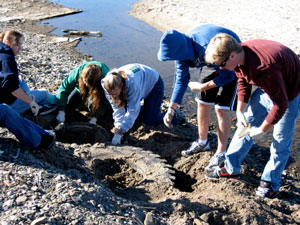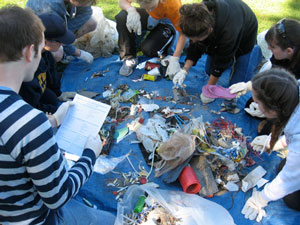|
|
On Saturday, Sept. 25, the Fredonia Academic Community Engagement (FACE) Center and EarthWorks, an environmental action group of the Unitarian Universalist Congregation of Northern Chautauqua County, will lead a beach cleanup at Point Gratiot in Dunkirk.
The beach sweep is part of the Ocean Conservancy’s 25th International Coastal Cleanup (ICC) campaign — the world's largest volunteer effort of its kind. Working shoulder-to-shoulder, the volunteers in the Cleanup’s global network not only pick up trash, they record every item they find on standardized data cards.
Ocean Conservancy compiles and analyzes the data each year, and publishes the world’s only item-by-item, location-by-location snapshot of marine debris in an annual report. More on this>>
The beach cleanup will last from noon to 2 p.m.
Students needing transportation to Point Gratiot should meet at 11:40 a.m. in the Houghton Hall parking lot. All volunteers should gather at the Point Gratiot Park parking lot (across from the metal stairs that descend to the beach) at noon for a brief orientation.
Gloves, garbage bags, and Ocean Conservancy materials will be provided.
At 1 p.m. volunteers will sort, weigh and catalog debris. Results from the cleanup will then be reported to the American Littoral Society and the Ocean Conservancy.
Last year, 500,000 volunteers collected more than 7.4 million pounds of trash in 108 countries and 45 US states during the 2009 ICC. Locally, 47 student and community volunteers gathered 380 pounds of trash at Point Gratiot during 2009 ICC event. On average, participants removed more than 400 pounds of debris for every mile of beach cleared that day.
Every year, thousand of marine mammals, sea turtles, seabirds, and other animals are sickened, injured, or killed because of trash in lakes and oceans. Animals choke or become poisoned when they eat trash and drown when they become entangle in bags, ropes, and old fishing gear. The majority of entangled animals found during last year’s ICC event were bound up by old fishing line.
According to Barbara Cohen of American Littoral Society, the ICC is an important opportunity for people to raise their awareness of pollution and to consider their own environmental impacts. As Cohen explains, “Humans have created the marine debris problem, and humans must take responsibility for it. The ICC data tells us that we are putting huge quantities of dangerous items into the ocean. Based on the accumulated evidence put forth over the past 24 years, we can help. Much of what winds up in our waterways wasn't truly necessary in the first place. We can produce less packaging up front and cut back on debris thorough programs that encourage positive changes in behavior.”
For many SUNY Fredonia students, the 2009 ICC was successful in promoting the awareness Cohen hopes for. Biology professor Michelle Kuns recollects last year’s clean-up and the impact it left on her students. “It made students think about the larger picture,” explains Kuns. “Participating in the clean-up of our relatively small, local beach made the students think about the amount of trash there must be along larger beaches, as well as on roadsides and even in forests throughout our country.”
The beach cleanup is sponsored by EarthWorks, the FACE Center and SUNY Fredonia’s Sustainability Committee. To learn more, contact Mitch Cummings of EarthWorks at 952-7490 or SUNY Fredonia's Dr. Christina Jarvis at 679-9254.





